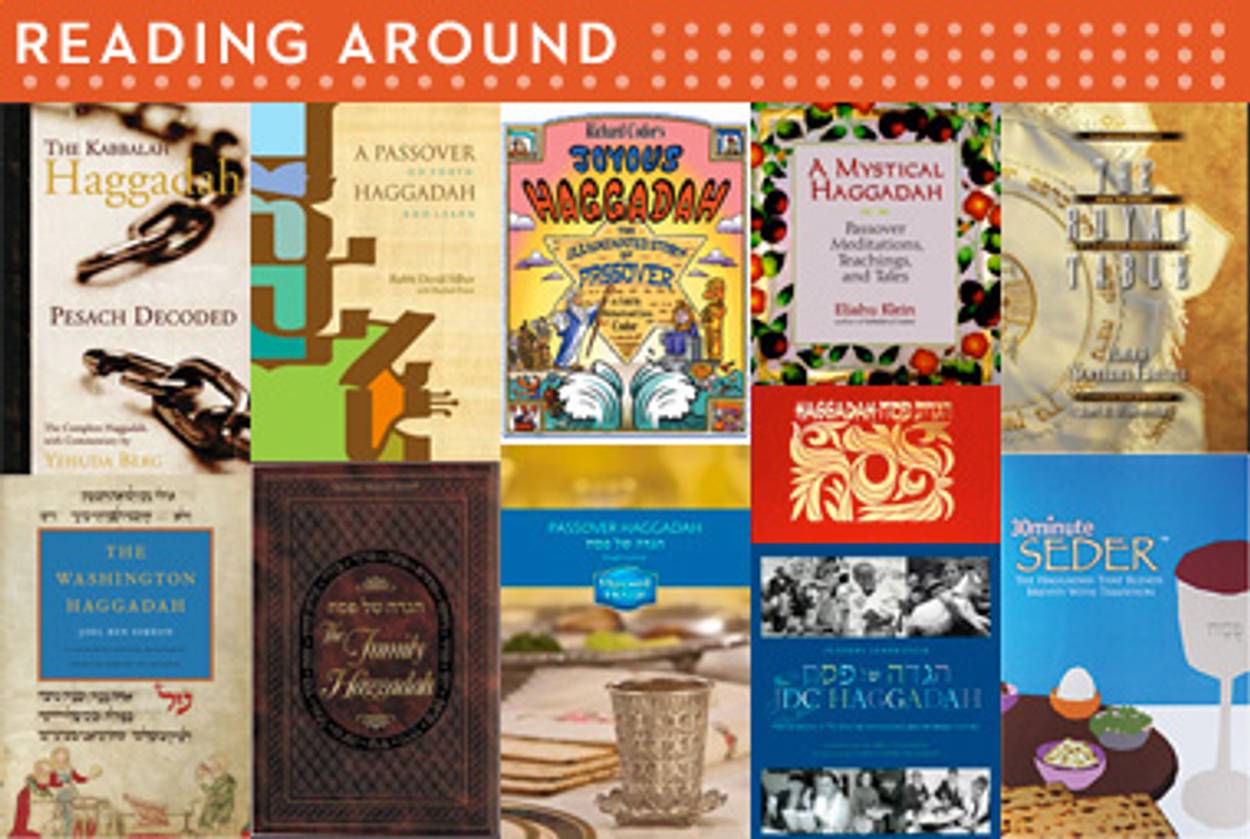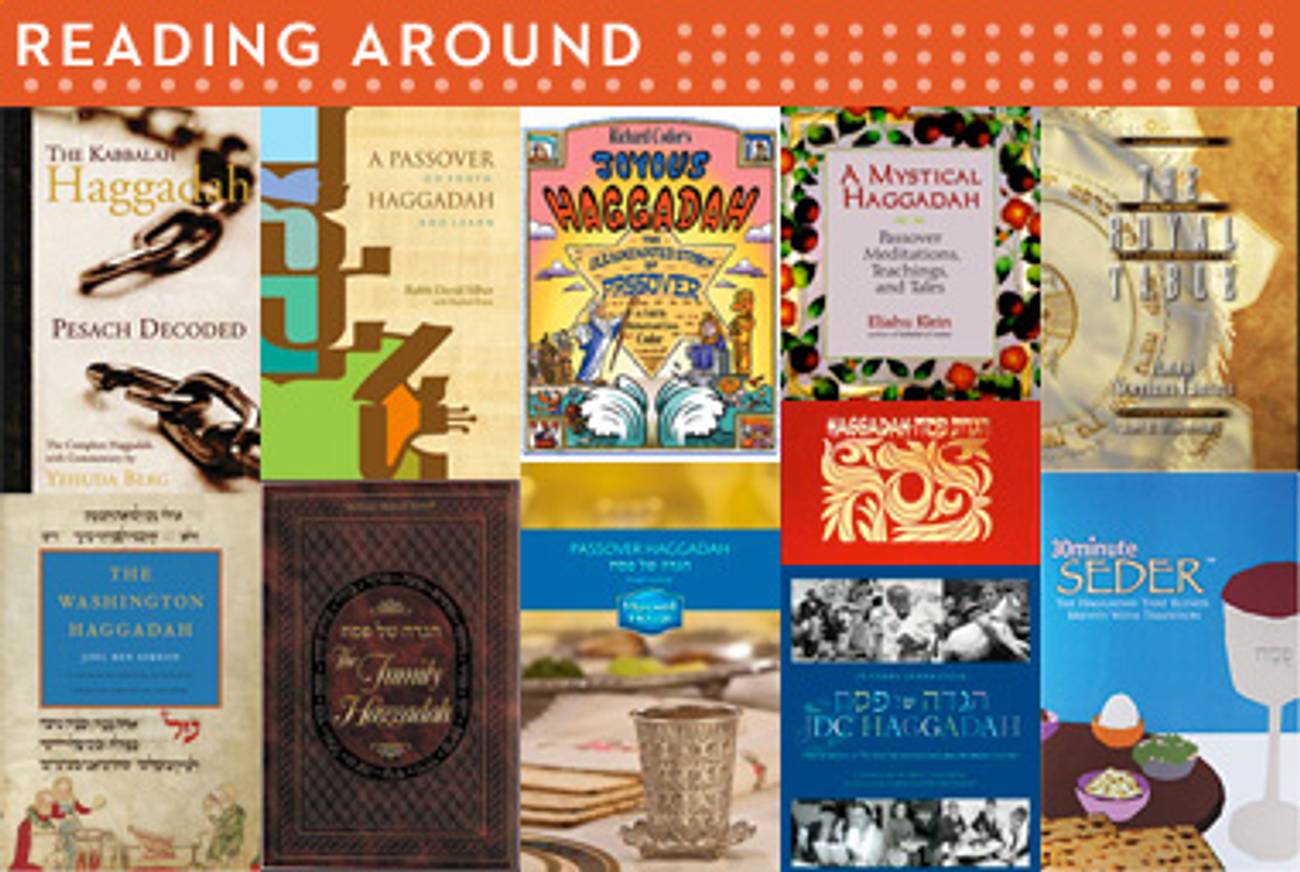On the Bookshelf
From the classic to the newfangled: haggadahs for Seders of every shape, size, and stripe




With thousands of haggadahs having been produced throughout history, and hundreds currently in print, how do you possibly choose? On the Bookshelf offers the following non-exhaustive primer.
Most refreshingly upfront about its goals: Robert Kopman’s 30 Minute Seder: The Haggadah That Blends Brevity With Tradition (30 Minute Seder, 2011). Who needs all that blah blah blah about Rabbi Elazar ben Azaryah and Rabbi Tarfon? This haggadah isn’t appropriate, though, if your guests are the types to say, “What? It’s time to eat already? Can’t we please spend more time discussing whether there were 50, 200, or 250 plagues at the Red Sea?”
Least appropriate for a Seder in Lilongwe, Malawi: Yehuda Berg’s The Kabbalah Haggadah: Pesach Decoded (Kabbalah Publishing, 2009) would, it seems, be something of a faux pas over there this year.
Perfect if you find yourself in a Brewster’s Millions situation: For $18,000, the Premier Edition of The Szyk Haggadah gives you Arthur Szyk’s signature embossed in gilt on the cover, plus “22 carat gold tooling” throughout. Guaranteed to match your gold-plated karpas! For the non-insane, there are reasonably priced editions of Szyk’s 1930s anti-fascist allegorical masterpiece, such as The Szyk Haggadah: Freedom Illuminated (Abrams, 2011).
If your guests don’t like all these newfangled Seder elements: Take them back to the 15th century with The Washington Haggadah (Harvard, 2011), which offers a full-color reproduction of a manuscript illuminated in 1478 by a scribe named Joel ben Simeon (and which is named for its contemporary home, at the Library of Congress in D.C.).
The haggadah we’re still waiting for: When, when will Jonathan Safran Foer and Nathan Englander deliver that hipster haggadah they’ve promised? It tarries, but according to Amazon.com, it will finally arrive in October 2011: just in time for Thanksgiving! Next year in Park Slope, then?
Likely to disappoint the Shakespearean actors at the table: The intrepid Sue Fishkoff reports that the new edition of the Maxwell House Haggadah—the haggadah of choice of the Obama White House—includes, for the first time since 1934, an updated translation that has removed all those fusty faux-Renaissance linguistic touches we’ve all gotten used to, like “thee” and “thou.” Alas, alack! How art we supposed to worshippeth our Lord in just plain American English?
If you believe that the Holocaust should be invoked at every Jewish public event: A Passover Haggadah (Simon & Schuster, 1993) features Mark Podwal’s drawings and Elie Wiesel’s commentary and poems, which link the ritual to recent historical trauma: “A camp./ An inmate. … It is night,/ The first night of Passover. … The parable of Had Gadya is misleading:/ God will not come/ To slay the slaughterer.”
For big families who don’t understand the idea of economy of scale: If all you want is the traditional, Orthodox text, Artscroll’s Family Haggadah (Artscroll, 1981) is a bargain: only $3.59 a copy, bound in sumptuous-sounding leatherette (or $2.24 with a laminated paper cover). But it seems that somebody’s tam son must be responsible for the price on the slipcovered, leatherette set of eight, which costs $33.29 (that is, $4.16 per copy), as if to punish those who buy in bulk.
Good for fans of chanting: Eliahu Klein’s A Mystical Haggadah: Passover Meditations, Teachings, and Tales (North Atlantic Books, 2008) includes “a mystical meditation” before most of the rituals, drawn from the Zohar or from such gurus as the Rashash. These, along with anecdotes about the Hassidic masters and a dash of playful gematria, help Seder-goers in “achieving cosmic consciousness.”
For those who actually do want to tell the story of the Exodus, over and over, until the break of dawn: A Passover Haggadah: Go Forth and Learn (JPS, 2011) comes equipped with the extensive commentaries of Rabbi David Silber. The founder of the Drisha Institute in New York, Silber knows a thing or two about Jewish textual study and offers enough textual readings to keep you talking until the sun comes up.
Looks sharpest in your NPR tote bag: Our Haggadah: Uniting Traditions for Interfaith Families (HarperCollins, March) allows you to greet Elijah alongside Cokie and Steven Roberts. The book comes to you straight from the D.C. intelligentsia, and brims with optimistic religious pluralism: as its authors told Vox Tablet a couple weeks back, Passover is by far the most Jesus-friendly of the Jewish holidays (blood libels notwithstanding).
For the tikkun olam crowd: Last year’s In Every Generation: The JDC Haggadah (Devora Publishing, 2010) features a forward by Rabbi Joseph Telushkin praising the Joint Distribution Committee for its outreach to threatened Jews all over the world, plus commentaries by Ari Goldman—but it’s the photographs of Seders across the globe, from Yemen to Lithuania, that make an impression.
If you have a favorite Orthodox superstar rabbi: Then he has a haggadah for you, whether it’s Rabbi Jonathan Sacks’ Haggadah (Contiuum, 2007), or Norman Lamm’s The Royal Table (Orthodox Union, 2010), or The Carlebach Haggadah: Seder Night With Reb Shlomo (Urim, 2001), or Seder Night: An Exalted Evening (Orthodox Union, 2009), which includes “commentary based on the teachings of Rabbi Joseph B. Soloveitchik.”
Closest you’ll get to a Family Circus or Marmaduke haggadah: Richard Codor’s Joyous Haggadah (Loose Line Productions, 2008) features an energetic comic strip retelling of the Exodus—nothing cries out for the Sunday Funnies treatment like the Death of the Firstborn, right?—plus, charmingly, the Four Sons as performed by the Marx Brothers.
Most appropriate for a Seder fueled by psychotropic drugs: Newly available for shipping to the United States, Asher Kalderon’s Haggadah (Urim, 2011) features the artist’s lush, gradient-shaded images, which have all the trippy verve of 1960s rock posters.
Josh Lambert (@joshnlambert), a Tablet Magazine contributing editor and comedy columnist, is the academic director of the Yiddish Book Center, Visiting Assistant Professor of English at the University of Massachusetts, Amherst, and author most recently of Unclean Lips: Obscenity, Jews, and American Culture.
Josh Lambert (@joshnlambert), a Tablet Magazine contributing editor and comedy columnist, is the academic director of the Yiddish Book Center, Visiting Assistant Professor of English at the University of Massachusetts, Amherst, and author most recently ofUnclean Lips: Obscenity, Jews, and American Culture.